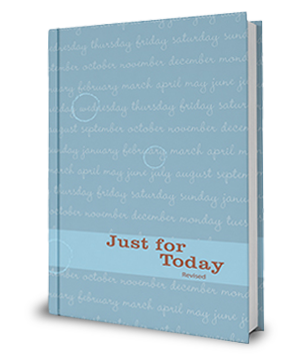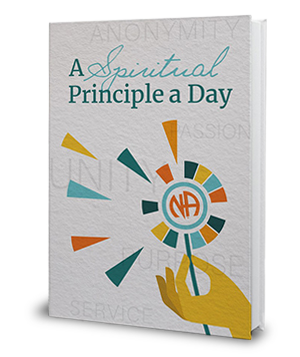Welcome to Narcotics Anonymous of NJ. Our Message Is…
That an addict, any addict can stop using drugs,
lose the desire to use, and find a new way to live.
Helpline
If you feel you have a problem with drugs, call our helpline
Events
See upcoming NA events and activities in NJ
Narcotics Anonymous is a nonprofit fellowship or society of men and women for whom drugs had become a major problem. We are recovering addicts who meet regularly to help each other stay clean.
– Narcotics Anonymous Basic Text, page 9
Recovery from addiction is possible and available through the 12 Steps and 12 Traditions of Narcotics Anonymous.
Narcotics Anonymous is FREEDOM from active addiction.
Narcotics Anonymous is an international, community-based association of recovering drug addicts with over 61,000 weekly meetings in over 131 countries worldwide.

Just for Today
"I want what I want, and I want it now!" That's about as patient as most of us ever got in our active addiction. The obsession and compulsion of our disease gave us a "one-track" way of thinking; when we wanted something, that's all we thought about. And the drugs we took taught us that instant gratification was never more than a dose away. It's no wonder that most of us came to Narcotics Anonymous with next to no patience.
The problem is, we can't always get what we want whenever we want it. Some of our wishes are pure fantasy; if we think about it, we'll realize we have no reason to believe those wishes will be fulfilled in our lifetimes. We probably can't even fulfill all our realistic desires; we certainly can't fulfill them all at once. In order to acquire or achieve some things, we will have to sacrifice others.
In our addiction we sought instant gratification, squandering our resources. In recovery we must learn to prioritize, sometimes denying the gratification of some desires in order to fulfill more important long-term goals. To do so requires patience. To find that patience, we practice our program of recovery, seeking the kind of full-bodied spiritual awakening that will allow us to live and enjoy life on life's terms.
A Spiritual Principal a Day
After years of willfully trying to control our lives, our moods, and other people to get what we want, we arrive in the rooms of NA and are told we must surrender every day and turn our will over to a Higher Power. On top of that, an inventory shows us that being controlling is a character defect that has constantly placed our needs at the center of all of our relationships. We thought we needed that control. How else were we going to get things done--the correct way? (Ours.)
"So, what are we supposed to do then?" a newer member demanded to know. "Just casually sit back and not handle things because we can't control the outcome or other people? I thought I'm supposed to be responsible now."
There's a fine line between being responsible and grabbing control. Few situations are black-and-white, all-or-nothing, so discerning the position of that line may be a lifelong endeavor. Few life lessons in recovery are learned in one go, but that doesn't mean we don't get better at living them. It takes much effort to gain the wisdom to know the difference between the things we can--and perhaps must--change and the things we must accept.
"So then, how?" the newcomer--and everyone else--wants to know.
The "how" of it is pretty standard NA stuff, isn't it? We listen to others' experience and talk about our struggles in this area. We seek suggestions and take them. Through stepwork, we reveal our self-centered tendencies and find strategies to address them. We say "yes" when asked to help, but we don't sacrifice our needs either. We own up to our mistakes and own our assets, too. Crucially, we start the lifelong process of assessing the difference between those two sparring voices in our heads. One is our disease that will tell us to avoid, deny, or control. And the other, which is connected to our Higher Power, is rooted in our values and our conscience, and, yes, our responsibility to do the right thing and let go of the outcome.

